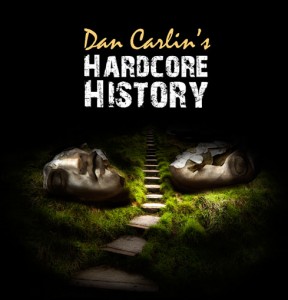
The Dispossessed by Ursula K. Le Guin
My rating: 5 of 5 stars
A few light years away from Terra, there is a dual system of a planet and a moon, similar to the one back home. The planet, Urras, is a beautiful planet, rich with natural splendour, floral and faunal variety and the kind of society you’d find on Terra: full of social inequalities and a global culture founded on ownership, reflecting almost nothing of its beauty on the lives of the population.
The moon of that planet is Anarres. It has an atmosphere that paints the sky violet but is little more than a large desert with not too much water and only a few species of plants and animals – the most advanced species apart from humans living there are fish. Humans from Urras have settled Anarres 150 years now, in the space-age equivalent of ’30s Catalonia, after a massive social movement in Urras following an important religious/revolutionary figure by the name of Odo forced the Urrasti to make concessions and agree with the revolutionaries to let them put themselves into exile on the moon, founding an anarchist society in the process.
Since then, the Odonians have led quiet, balanced, happy lives on Anarres. Odo’s theories/preachings supported that people are like cells of a single organism, together with the rest of life forming a greater consciousness, and should act the part, leaving ownership and “egoising” behind and focusing on the welfare of the community. Every man’s or woman’s duty in this society is to do the thing they can do and enjoy doing best, similar to a specialised organic cell, so that they should be productive as well as happy and fulfilled in the process: that was her secret of a balanced and healthy society, in tune with its environment and living space. As a sidenote, I’d like to point out here that the same ideology is represented in 1984: that IngSoc is an organism that consists of tiny cells which are the members of the party. It asks a completey different quesion based on that assumption though: “do you die every time you clip your fingernails, Winston?” It uses this train of thought to argue for the survival of the organism even when its individual members have to be eliminated in order to ensure survival of the greater consciousness; quite the opposite of what Odo says, which is that the welfare of the organism depends on individual welfare as well as the co-operation and solidarity between its cells. In both sides of the argument, egoism is repressed, but for completely different reasons.
To return to Odonianism: to allow themselves to have such a lifestyle, people would have to get rid of such distractions as wasteful culture including ownership, money and egoistical behaviour. The experiment worked and the results we catch a glimpse of in The Dispossessed.
People on Anarres share everything, even their homes and their sexual partners — keeping a partner for yourself is regarded as egoistical and equivalent to having them as your property; it is thus disencouraged (as are all possessive pronouns, even when it comes to family relationships) unless it’s for rearing a child. People are free to lead the lives they please as long as they don’t get in the way of their ammars, that is to say their brothers, doing the same.
The protagonist is a guy named Shevek, a name given to him by a computer as is the tradition in Anarres, which ensures the uniqueness of every individual and the uselessness of last names, in turn weakening family ties in favour of a more collective familial sentiment. The reader follows Shevek throughout his life and the problems he has growing up in this society when he is not as sociable as others. You see, he is a scientist, a theoretical physicist with great potential. But what happens when his society, good, balanced and just as it may be, doesn’t allow him to be the best he can be? For games of power exist in Anarres as well, and the person in charge of him in the institute knows the ropes very well; the difference is that the payoff is influence and fame, not money. What should he do: try leaving Anarres for Urras to make his ideas known and accepted there, making the world better in the process, or stay in his society following the norms that forbid most kinds of communication with the outer world?
The answer is given in the first chapter of the book, whence we follow Shevek in his stay in Urras. The book is chronologically mixed up (fittingly, in my opinion, as Shevek’s main goal in his field is to make a unified theory of simulaneous time) and alternately follows Shevek’s backstory in Anarres and his present life in Urras. Both settings were equally satisfying: looking at a foreign anarchist who’s never known anything else coming in contact with “profiteer” (a horrible insult in Pravic) society, is just as interesting as looking at how people have managed to build a fully working bona fide anarchist society in Anarres and the details of their day-to-day existence on the arid planet.
I have divulged this much of the book’s plot for it is not therein that its charm is hidden. I don’t think I’m blurting out spoilers here. There is little mystery or what we’d recognise as development in the story. The feeling it gave me was much less of a thrilling narrative and much more of a beautiful journey in a foreign land. All the other characters apart from Shevek, even perhaps Shevek himself, were there only to guide us through this utopia. The little things the traveller discovers are what make The Dispossessed a zen-like, heart-warming experience: Shevek’s first encounters with animals; his discussion with a Terran embassador; labour allocation in Anarres; the contrast between the placentas being kept after birth in Anarres as part of their zero-waste culture and the huge shopping malls in Urras, which could make any Anarresti physically ill; sex in Urras and how Shevek finds it so foreign and pretentious, and so on.
Furthermore, and I think this is very important, we get a look at the disadvantages of living in an anarchist society as Shevek experiences them; the necessity of sacrificing certain ambitions in favour of the common good, the morality of the question itself, the tendency of people, no matter what political inclination they have and culture they belong to, to grow conservative over time and forget their very own beliefs, growing rigid and rule-abiding rather than flexible and people-friendly, utilitarian rathen than deontological…
“She [Le Guin] invites, as Tolkien does, a total belief”, reads a snippet of a critic on the back-cover of my copy. If a sci-fi novel can make me believe in the existence of a real anarchist society somewhere in the galaxy and by extension in the real possibility of an anarchist society much closer to home, I can’t but heartliy agree with the above snippet.
View all my reviews





